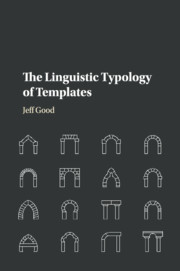Book contents
- Frontmatter
- Contents
- List of figures
- List of tables
- Acknowledgments
- Glossing abbreviations
- 1 Defining template
- 2 A typological description language for templates
- 3 Typologizing templates: case studies
- 4 Typologizing templates: comparison
- 5 Moving forward
- Appendix Specification of template description language
- References
- Author index
- Author index
- Term index
4 - Typologizing templates: comparison
Published online by Cambridge University Press: 05 February 2016
- Frontmatter
- Contents
- List of figures
- List of tables
- Acknowledgments
- Glossing abbreviations
- 1 Defining template
- 2 A typological description language for templates
- 3 Typologizing templates: case studies
- 4 Typologizing templates: comparison
- 5 Moving forward
- Appendix Specification of template description language
- References
- Author index
- Author index
- Term index
Summary
Comparing templatic descriptions
Chapter 2 developed a rich formal description language for templatic constructions, and Chapter 3 described a number of templates using that language. A major goal of this study is, however, not merely to describe templates but also to investigate their typology. The description language can, in fact, be understood as a claim regarding the descriptive typology of templatic constructions, but, as discussed in Section 1.6, templates are, in some sense, a wastebasket class. This makes knowing if a given descriptive typology is reasonably exhaustive, or, in some sense, “accurate,” more difficult than for phenomena (e.g., word order) where our approaches to their analysis make laying out a logical space of possibilities more straightforward.
Accordingly, it is important to find some way to rigorously compare the templates described here, since it is by means of such comparison that we can begin to detect unexpected similarities and differences and determine which templatic descriptions deserve further scrutiny, perhaps because they are especially deviant from other descriptions. The process of such comparison is, therefore, further likely to allow for testing of the plausibility of existing templatic descriptions and to indicate where refinements are needed to the descriptive typology. Moreover, to the extent that it may permit the descriptive typology to “stabilize,” it will lay the groundwork for the coding of a sufficiently large number of desmemes that the templatic patterns of the world's languages can be quantitatively explored in a systematic way, with an ultimate goal of determining the limits of templaticity and detecting universals in the patterning of templatic structures.
The present study is not able to achieve these latter goals, of course: the current database contains an insufficient number of templates. Moreover, work needs to be done on understanding what kinds of information can be reliably gleaned from logically possible approaches to comparison of the complex formal structures employed here. However, it is possible to work on a more limited problem which, nevertheless, represents a crucial step towards understanding the larger research questions posed by patterns of linear stipulation. Recent advances in data processing technology allow us to develop the means through which the formal characterizations employed in this study can be rigorously compared for different purposes.
- Type
- Chapter
- Information
- The Linguistic Typology of Templates , pp. 216 - 258Publisher: Cambridge University PressPrint publication year: 2016

